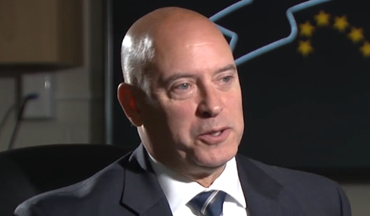
At least twice in his career as an East Cleveland cop since so-called “chief” of police Michael Cardilli has let his Ohio Peace Officer Training Academy (OPOTA) credentials expire.
The first time was for 5 years between November 17, 1999 and August 10, 2005. The city’s late chief of police, and not the mayor, received an August 10, 2005 letter from Ohio Attorney General Jim Petro’s office telling her that Cardilli and another cop, Paula Robinson, had continued to impersonate law enforcement officers for 5 and 13 years past dates they should have “ceased performing the duties of a peace officer and carrying a firearm” pursuant to the enforcement section found in 109:2-18-06(A) of Ohio’s administrative code.
“Pursuant to division (B) of section 109.803 of the Revised Code, any peace officer or trooper who, in any calendar year, fails to comply with the continuing professional training requirements set forth in paragraphs 109:2-18-01 to 109:2-18-07 of the Administrative Code shall cease carrying a firearm and shall cease performing the functions of a peace officer or trooper until such time as evidence of compliance is filed with the executive director. This rule does not apply to peace officers or troopers for whom an extension of time has been granted by the executive director.”
Petro’s letter was copied to Cuyahoga County Prosecuting Attorney William D. Mason. Instead of sending it to the chief of police it was the mayor as “chief law enforcement officer” under Ohio law who should have received it. That’s the official appointing authority for police officers. Only the mayor or city manager can administer oaths of office and appoint police officers.

In Cardilli and Robinson’s case the chief withheld the information from the mayor and asked for an extension. Petro’s office denied her request because extensions were granted for 90 days before credentials expired and not 5 and 13 years afterwards. Every arrest, testimony delivered in court and paycheck received by Cardilli and Robinson compounded their felonious violation of the state’s impersonating a peace officer statute found in section 2921.51 of Ohio’s revised code.
Despite federal misprision of felony laws found in Chapter 18 and section 4 of the United States Code that make it a felony for an official to know of a felony and not report it; Mason ignored all the unlawful arrests and “theft in office” pay checks and pension benefits Cardilli and Robinson received to perform law enforcement duties they’d been told to stop performing. Mason chose to conceal their felonious acts against possibly hundreds of people the two cop impersonators had unlawfully arrested. The former prosecuting attorney also let Cardilli testify with expired credentials in a murder trial that involved Tonica Jenkins in 2003.

She’s the woman who forged credentials to get into Yale University; who bought coke with her mother from an undercover DEA agent in Florida; and who took Melissa Latham to a Strongsville dentist to get her teeth cleaned using her name so she could kill her to create the illusion she was dead. It all began on April 20, 2001 exactly 520 days after Ohio law required Cardilli to stop performing law enforcement duties and wearing a gun.
After Malissa escaped the death Jenkins planned for her East Cleveland cops investigated. Jenkins’ appeal of Judge Lillian Greene’s 20 year conviction includes the following reference to testimony offered by ex-East Cleveland cop Gary Harper.
“Officer Gary Harper interviewed Martin and Latham. As part of his investigation, he and his partner, Officer Michael Cardilli searched the area around the house on Delmont where they found a blood-stained brick.”

So Cardilli on or around April 20, 2001 had not ceased to perform the duties of a peace officer and was still wearing a gun.
The last cease letter in Cardilli’s file was from Petro in 2005 even though his OPOTA credentials were expired as recently as July 2018. In 8 years under DeWine’s watch Chasing Justice researcher Mariah Crenshaw identified 12 out of 27 individuals performing police duties with expired credentials and in violation of 109:2-18-06(A) of the enforcement section of the administrative code.
Neither the mayor nor the county prosecuting attorney received notification from current Attorney General Richard Michael DeWine because his office isn’t sending them out. One of the cops with expired credentials, Scott Gardner, impersonated a peace officer when he assisted DeWine in his investigation of Timothy Russell and Malissa Williams’ 137 bullets deaths at the hands of Cleveland cop Michael Brelo and others.
Mary Davis is DeWine’s OPOTA director and the state official charged with enforcing 109:2-18-06 of the state’s administrative code. She’s not issued any cease letters since taking over the job and instead has operated on a self-created “honor system” that recklessly ignores the duties of the state law she’s supposed to enforce. DeWine shared with East Cleveland activist Justyn Anderson that Davis has failed to report any controversies involving the city’s police to him.
Anderson confirmed to EJB NEWS that he spoke with Cuyahoga County prosecuting attorney Michael O’Malley about East Cleveland’s mayor, Brandon King, allowing cops to work without valid OPOTA credentials. O’Malley said DeWine’s office had not alerted him.
Crenshaw’s “Chasing Justice” research revealed that the last Ohio attorney general to issue the cease letters to any East Cleveland was attorney Richard Cordray who’s now campaigning against DeWine for governor.
There is no “retroactivity” provision in OAC:2-1-12. When an Ohio peace officer’s credentials expire they are to “cease performing the duties of a peace officer and wearing a weapon.”
Cardilli claimed he and other East Cleveland cops were compliant. Records reveal they took sample test questions from the Attorney General’s “home” page without logging into the OHLEG account to take the “real” test. OHLEG is short for “Ohio Law Enforcement Gateway.”





